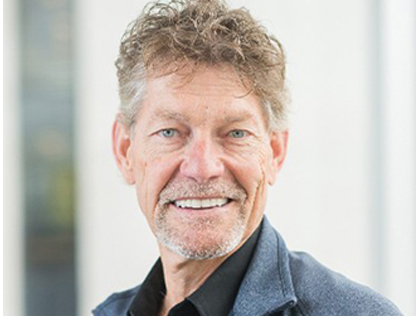

Professor Dietmar Neufeld believes that an effective teacher is someone who can perform the story.
“In the beginning was the word, and the word was performance.”
So goes one of Professor Dietmar Neufeld’s mantras, which is also a tool he uses for unearthing the origins of Christianity.
Everyone’s heard of the Bible and the four Gospels, says Neufeld, a McGill graduate who has taught in the UBC Dept. of Classical, Near Eastern, and Religious Studies for nearly two decades. But fewer know about the numerous texts that the early Church fathers kept out, texts such as the Infancy Gospel of Thomas, which talks about Jesus as a five-year-old. “He was a nasty little kid, he made it his business to kill his colleagues if they got him angry,” Neufeld relates. “Somebody imagined Jesus that way. So who would not be interested in that? Tell me. Hugely fascinating stuff.”
Often, he says, the performative power of storytelling is at the heart of the ancient texts like the Infancy Gospel. In antiquity, as now, stories were key in defining rival ideologies of God and humankind. “Religion is at the heart of constituting an identity, constituting a world view, and constituting values and attitudes about sexuality, gender, and body,” Neufeld says when asked why he set out to study it. “I was really curious as to how all that worked.”
Neufeld was also personally influenced by religion’s political consequences: he was raised in Paraguay, which is where his Mennonite parents fled to escape religious persecution in Stalinist Russia.
A Diverse Background, A Variety of Research
But getting down to brass tacks is a difficult thing to do when it comes to religion; in addition to teaching a course in Hellenistic Greek, Neufeld also teaches a course on the history of the Christian church, which means his area of research spans all the way from Constantine the Great to modern-day televangelists, roughly three millennia. “I found myself in the first couple years, and still, really, on the thin edge of the wedge of my incompetence, where the students knew more than I did,” he laughs. It’s an exaggeration of course, but he says that since he lectures on such a vast historical time frame he says he’s okay with not knowing everything. “You know, I begin my classes by saying ‘Look, we’re learners in this thing together’.”
Neufeld’s classes are themselves totally unscripted. “I don’t have a set of lecture notes — ever — that I keep repeating year after year.”
“I know exactly where I’m going, and what I want to do, but the reason I don’t is because I run into things that I want to bring into class as I’m doing my research.”
Often he brings in materials that have to do with ecstasy, the altered state of consciousness that many writers living around Christ’s lifetime turned to in order to produce their accounts of the divine. “There is a huge body of literature that discusses this,” he says, noting that writers like Paul, John, and Daniel put a lot of stock in out-of-body experiences in the Bible. Neufeld has long asked why, and he says these speech acts are a kind of performance, crucial for creating an us-and-them distinction.
This interest in performance has spilled over into unexpected places. “It’s been hugely influential for me in terms of the teaching that I do,” he says.
“If you’re going to be effective as a teacher, perform the story.”
By Bryan Zandberg (BA, 2006, in French and Spanish). Bryan is a former editor with The Ubyssey.
2008


